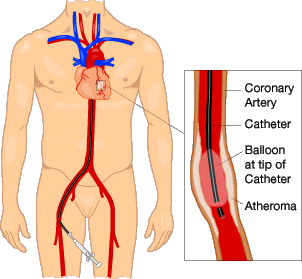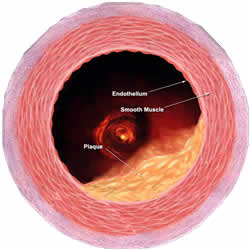Angioprim - A Natural Alternative to Angioplasty

Angioprim is the most effective method to clean block arteries and promote heart health. Use of Angioprim has been known to help with removing the plaque in the extremities. We back up our claim with a 100% money back gaurantee. Diet and Exercise are touted as the true path to heart health, but without some method of cleaning arteries and the cardiovascular system, diet and exercise alone won't help.
Angioprim's proprietary blend of amino acids, including EDTA, promotes the production of essential hormones and enzymes in addition to serving it's primary function of cleansing the cardiovascular system. These increased hormones and enzymes help the body regulate itself like it did when you were much younger.
Angioprim is a liquid that you mix with juice, purified water, or virtually any liquid that is mineral free. You take it in the morning and spend the rest of your day living your life. With each passing day during the cleansing your life will be richer and more energetic, and give you more and more freedom to be the youthful vigorous you that you remember.
Click on ORDER NOW to begin your journey to Cleaner Arteries.
Click on LEARN MORE to read more details on this product.
Click on ASK OUR CUSTOMERS to talk to some of the fine folks that have used Angioprim
The Primary function of EDTA is to remove unwanted metals in particular calcium from bodies vital organs and arteries. |
|
There are three primary methods of chelation therapy: Intravenous, Suppository and Oral. Intravenous or IV chelation is considered by many to be the superior treatment method. Some in the industry claim, oral chelation using EDTA is only 5% as effective as IV (intravenous) chelation. The people making those claims are the same ones providing IV (intravenous) chelation treatment. Testimonials from our customers that have used IV or Suppository treatment and then used Angioprim have consistently stated "Angioprim is faster and much more effective in providing real health benefits than IV or suppository Chelation." Angioprim is a pure liquid concentrate and can be taken frequently. EDTA is one of the most powerful metal chelators known and a primary ingredient of Angioprim. The Benefits of chelation therapy using EDTA were recognized by the medical community as a treatment for The name EDTA is not as it appears Unfortunately, EDTA has become a commonly accepted name, and there are many forms and chemical formulas for the same basic product called EDTA. Therefore, comparisons are very difficult to make. EDTA's function is to bind to unwanted metals, principally Calcium in the blood. Some people claim a popular and widely used form "Calcium EDTA" which is already bonded to a calcium, will break apart after it is in the body, release the calcium it's bound to and then become available to bind to other calcium, this is not possible. A lack of understanding the concept of calcium exchange explains why studies have shown EDTA to be ineffective. Most forms of EDTA don't work well, while others don't work at all and almost all break down by stomach acids. Almost all of these compounds are bonded with one or more metals:Calcium, Magnesium, Phosphorous, Iron, Copper, Borax, Potassium. Below is a partial list of Products called EDTA Edetate Disodium, Dihydrate, BiotechGrade Edetate Disodium, Dihydrate, FCC Edetate Disodium, Dihydrate, Reagent, ACS Edetate Disodium, Dihydrate, USP EDTA Disodium Salt, 0.005 M Solution EDTA Disodium Salt, 0.015 M Solution EDTA Disodium Salt, 0.0575 N Solution EDTA Disodium Salt, 0.06 M Solution EDTA Disodium Salt, 0.115 M Solution EDTA Disodium Salt, SVS Concentrate EDTA Disodium Salt, SVS Concentrate EDTA Disodium, 0.01 M Solution EDTA Disodium, 0.01 M Solution EDTA Disodium, 0.05 M Solution EDTA Disodium, 0.0575 M Solution EDTA Disodium, 0.1 M Solution EDTA Disodium, 0.5 M Solution EDTA Disodium, 10% (w/v) Solution EDTA Disodium, 2.5% (w/v) Aqueous Solution EDTA Stabilizer Solution, 500 g/L Ethylenediaminetetraacetic Acid Calcium Disodium Salt Ethylenediaminetetraacetic Acid Copper (II) Disodium Salt Ethylenediaminetetraacetic Acid Dicalcium Salt Ethylenediaminetetraacetic Acid Dimagnesium Salt Ethylenediaminetetraacetic Acid Dipotassium Salt Reagent Ethylenediaminetetraacetic Acid Iron (III) Ethylenediaminetetraacetic Acid Magnesium Disodium Salt Ethylenediaminetetraacetic Acid Tetrasodium Salt, Reagent Ethylenediaminetetraacetic Acid Tripotassium Salt, Dihydrate Ethylenediaminetetraacetic Acid Trisodium Salt Ethylenediaminetetraacetic Acid, Dipotassium Magnesium Salt, Dihydrate Ethylenediaminetetraacetic Acid, Iron (III) Sodium Salt Ethylenediaminetetraacetic Acid, Powder, Primary Standard Ethylenediaminetetraacetic Acid, Powder, Reagent, ACS Hydroxylamine-EDTA Solution Magnesium EDTA, 0.02% (w/v) Solution N-(2-Hydroxyethyl)ethylenediaminetriacetic Acid N-(2-Hydroxyethyl)ethylenediaminetriacetic Acid Trisodium Salt, Hydrate Saline-Sodium Phosphate-EDTA, 20X Solution Saline-Sodium Phosphate-EDTA, 20X, Powder, Ultrapure Tris-Acetate-EDTA, 25X Solution Tris-Acetate-EDTA, 25X, Powder Tris-Borate-EDTA, 10X Solution Tris-Borate-EDTA, 10X, Powder Tris-Borate-EDTA, Extended Range, 10X Solution Tris-EDTA, 100X Solution Tris-EDTA, 100X, Powder Tris-EDTA, Sterile Reagent Solution So which EDTA is best to use? .......the one in Angioprim! It's been proven for over 10 Years. More About EDTA EDTA is a chelating agent which means ethylenediaminetetraacetic acid, it is a novel molecule that acts as an anticoagulant in medical and laboratory equipment. It is only used in tubes of blood and medical machinery since it chelates all the calcium contained in blood. This comes in the form of a powder or small amount of liquid in tubes. It is famous for being used as a medical treatment for acute hypocalcaemia and lead poisoning as well as a preservative in cosmetics and some processed foods. Even dentists use this compound as a root canal irritant in removing organic and inorganic debris compounds. Even with the best surgical care available at the most advanced technological hospital, thousands of people continue to die because of coronary diseases. Medical insurance companies could realize long-term savings by reducing a patient's dependencies on expensive surgeries, angioplasties and rehabilitations. Angioprim can improve a patient's health at a very low cost. It gives hope to people who are hopeless to afford expensive medical surgeries. Angioprim offers patients a less invasive treatment that gives them fast results at a very low cost. With Angioprim, patients feel they are given a second lease on life. |
High Blood Pressure |
|
High Blood pressure can be caused by Plaque in the ARTERIES that reduces blood flow causing the heart (our blood pump) to work harder and at higher pressure to keep the same amount of blood flowing in those restricted arteries. You don't have to have all your arteries restricted, just one or two small blockages almost anywhere in your body can act like a dam, holding back blood flow and increasing blood pressure.
Donít Gamble With Your Life !
|
What is Angioplasty? (Stents) |
|
Angioplasty squashes the plaque against the sides of your artery walls with a balloon and then holds it captive with a metal stent. After surgery you will still have Cardiovascular disease, because the plaque buildup you have in other areas of your body has not been addressed! In addition the plaque is still present next to the stent in the artery. Surgery does not have to be your first choice, but it is one of your choices, because 40 % of those having heart surgery can suffer long term mental dysfunction because of the surgery. Surgery only provides temporary relief, and never address' the cause of the disease, this insures you will have regular visits to the doctor's office along with lifelong prescriptions refills. This is what modern medicine is all about folks. You can't win. Coronary angioplasty (AN-jee-o-plas-tee) is a procedure to open clogged blood vessels of the heart. Coronary angioplasty treats vessels, called coronary arteries, which deliver blood to heart muscles. A tiny balloon on a narrow tube, called a catheter, is used to widen a clogged artery and improve blood flow. |
What Is Arterial Plaque ? |
|
You have probably heard of plaque on your teeth, but your body also has another type of plaque. This is Arterial Plaque that builds up in arteries causes Blocked or Clogged Arteries. This will restrict blood vessels to carry oxygen and nutrient-rich blood from your heart to your body's tissues. What Is Arterial Plaque Made Of? Arterial Plaque in the arteries is made up of fat, cholesterol, calcium, and other substances found in the blood that forms deposits in the artery wall. These deposits can narrow the artery and reduce blood flow. This is called atherosclerosis or "hardening of the arteries." Arterial Plaque can also rupture and create a blood clot at the rupture site, as your body's natural processes try to repair the "injury." The blood clot can cut off blood flow through the artery and starve your body's tissues of oxygen and nutrients. Therefore, Arterial Plaque can be serious: It is the most common cause of a heart attack or stroke. It will frequently be described by doctors as a percentage of the artery that is restricted. |


